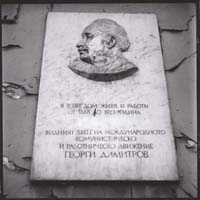Giorgi Dimitrov, first communist president of Bulgaria, communist hero of the Reichstag Fire Trial, General Secretary of the Comintern, whose parents were Macedonians from Pirin, (Bulgarian) Macedonia was, at one time, an evangelical Christian!
Now you know.

Bubkes: The Weblog of Stephen Lewis
Last winter, I examined the registry of a Methodist church in the city of Pleven in northern Bulgaria. An entry for September 30, 1906 notes the wedding of 26 year-old Georgi Dimitrov, a bachelor, to 27 year-old Lyuba Ivanovich, a divorcee. Under the column marked "Belief", Lyuba inscribed herself as a free thinker, Georgi Dimitrov as an Evangelical Christian.
Dimitrov's self-identification as an Evangelical Protestant may have come from his mother, Paraskeva, a member of the Evangelical congregation at the town of Bansko in the southwest of present-day Bulgaria. In the last decades of Ottoman rule, Bansko was the base for the spread of Protestant Christianity throughout greater Macedonia. In 1945, not long after the start of communist rule in Bulgaria, Paraskeva's body was interred by her son in a family plot in the Protestant section of Sofia's central cemetery. The headstone of her grave is discretely marked, not with a cross, but with a five-pointed communist star. Dimitrov's present grave lies only a few meters away.
Evangelical Protestantism was brought to the southern Balkans by a small group of dedicated American missionaries -- Congregationalist and Methodist -- who radiated out from Robert College in Istanbul beginning in the mid-19th century. The Evangelicals were granted a firman (license) by the Ottoman Sultans to preach to non-Muslims. Their efforts succeeded to some degree amongst Armenians in the east of Anatolia but failed miserably amongst the Jews of Smyrna and Salonika. In Bulgaria, the missionaries found a not-yet-independent country in the midst of a spiritual search and a search for national identity. The autocephalic Bulgarian Orthodox Church had not yet been founded (this was not to occur until 1870) and Bulgarian Christianity was controlled by the Greek Orthodox hierarchy. At the time, Bulgarians thirsted for a readable translation of the bible into their day-to-day tongue; the missionaries worked with local literati to create and distribute one. Bulgarians sought religious instruction; the missionaries provided it. Bulgarians required secular and vocational education, the missionaries organized schools and colleges, for men and women both.
At first, the missionaries did not press Bulgarians to convert to Protestantism, but a number converted nonetheless. Their possible motivations: a search for community, a belief in egalitarianism, a turn to inspiration from the West, or a desire for personal religion and direct contact with God unobstructed by hierarchy, obscurantism, ritual , or fatalism -- Christianity as role model rather than mystery, as it were.
The first Bulgarian converts to Protestantism were persecuted by their countrymen, some of whom considered them to be traitors, voluntary defectors from the Bulgarian nation -- especially after the founding of the Bulgarian Orthodox Church. As late as the early-20th century, Protestant churches were vandalized or burned at the instigation of Orthodox clerics and Evangelical converts hounded from one village to the next. In some towns, Bulgarian Orthodox monks and laity pressed for the closure of Protestant schools. Ironically, persecution resumed in the late 1940's, this time under the rule of the regime founded by ex- Evangelical Georgi Dimitrov. In 1948, Protestant pastors (Baptists and Adventists as well as Methodists and Congregationalists) were arrested en masse and tried and imprisoned for spying for the West. Many churches were closed and in much of the country Protestant life was forced underground.
In Bulgaria, openness to Evangelical Protestantism during the late-19th century was part of the ferment of a society in the midst of a shift from east to west, from traditional to modern, from hierarchical to partially democratic -- a society on the way to determining its own identity and course. In the midst of this ferment, many people turned to Marxism, others to mysticism, and a few to religions of the East. Georgi Dimitrov was for years a neighbor and possibly a friend of Peter Danev, Bulgarian apostle of the White Brotherhood movement, who believed that the soaring heights of Bulgarias's Rila and Pirin mountain ranges were literal gateways to heaven. Dimitrov and Danev may have both known poet Geo Milev, whose life was influenced by the teachings of Bahá'u'lláh.



No comments:
Post a Comment